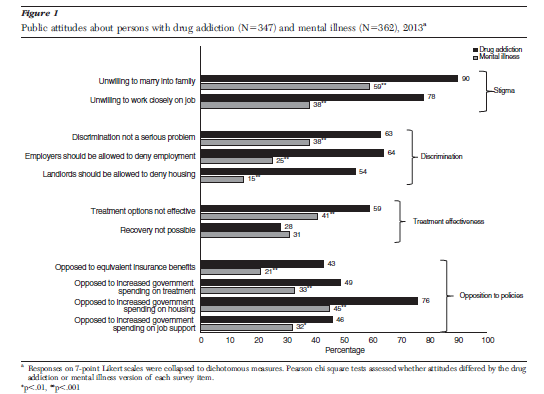Is Mental Illness or Drug Addiction More Stigmatized?
Research has found that negative attitudes among Americans towards individuals with mental illness still persist. Negative public attitudes towards persons with mental illness are known and pervasive, whereas, less information is known about public attitudes towards person with substance use disorder (SUD).
Data suggests that public views about individuals with substance use disorders more negatively than those about persons with mental illness.
Barry and colleagues designed and implemented a brief web-based national public opinion survey (n=709) between October and December 2013. Participants were asked about their attitudes toward either drug addiction or mental illness. Half of the sample (n=362) were asked questions in reference to mental illness and the other half of the sample (n=347) were asked the same questions about in reference to drug addiction.
The authors used a previously recruited probability-based online panel (n=50,000) of adults in cell phone-only households using equal probability sampling with a sample frame of resident addresses covering 97% of the general U.S. households.
Outcomes examined included:
- stigma
- acceptability of discrimination towards individuals with mental illness or drug addiction
- support for policy items including insurance parity and government spending on treatment, housing, and employment opportunities
Overwhelmingly, the authors found that Americans hold more negative attitudes towards persons with drug addiction than towards persons with mental illness.
More individuals were unwilling to have a person with drug addiction marry into their family (90% versus 59%) or work closely with them on a job (78% versus 38%) compared to a person with mental illness.
Respondents were also more likely to view discrimination against persons with drug addiction as “not a serious crime” compared to discrimination against persons with mental illness (63% versus 38%).
64% of respondents felt that employers should be able to deny employment to individuals with drug addiction compared to 25% who felt the same about individuals with mental illness. Similar results were found when examining whether respondents felt that landlords should be able to deny housing to a person with drug addiction or mental illness (54% versus 15%).
59% of respondents reported believing that treatment options were ineffective in controlling symptoms related to drug addiction compared to 41% who believed the same about mental illness treatment.
Overall, respondents reported higher opposition to policies addressing drug addiction than policies addressing mental illness.
Authors reported:
- 43% of respondents were opposed to equivalent insurance benefits for individuals with drug addiction compared to 21% for individuals with mental illness.
- 49% reported being opposed to increased government spending on treatment for persons with drug addiction compared to 33% for increased government spending on treatment for persons with mental illness.
- 76% reported being opposed when it pertained to increased government spending on housing for individuals with drug addiction, compared to 45% being opposed to increased spending for housing for individuals with mental illness
- 46% of respondents reported being opposed to increased government spending on job support for individuals with drug addiction compared to only 32% being opposed to increased spending on job support for individuals with mental illness.

Source: (Barry et al., 2014)
IN CONTEXT
This study found that Americans hold significantly more negative attitudes towards persons with drug addiction than persons with mental illness.
These attitudes translate into lower support for policies that would increase housing and employment support for persons with drug addiction. The negative attitudes towards persons with drug addiction also suggest less sympathetic views about addiction being a chronic condition.
The authors also suggest examining how portraying addiction and mental illness as treatable may change the public’s perception about substance use and mental illness by reducing stigma through education. Since mental illness and substance use can be co-morbid conditions, it is increasingly important to work to decrease stigma for both conditions.
CITATIONS
Barry, C. L., McGinty, E. E., Pescosolido, B. A., & Goldman, H. H. (2014). Stigma, discrimination, treatment effectiveness, and policy: public views about drug addiction and mental illness. Psychiatric Services, 65(10), 1269-1272.

